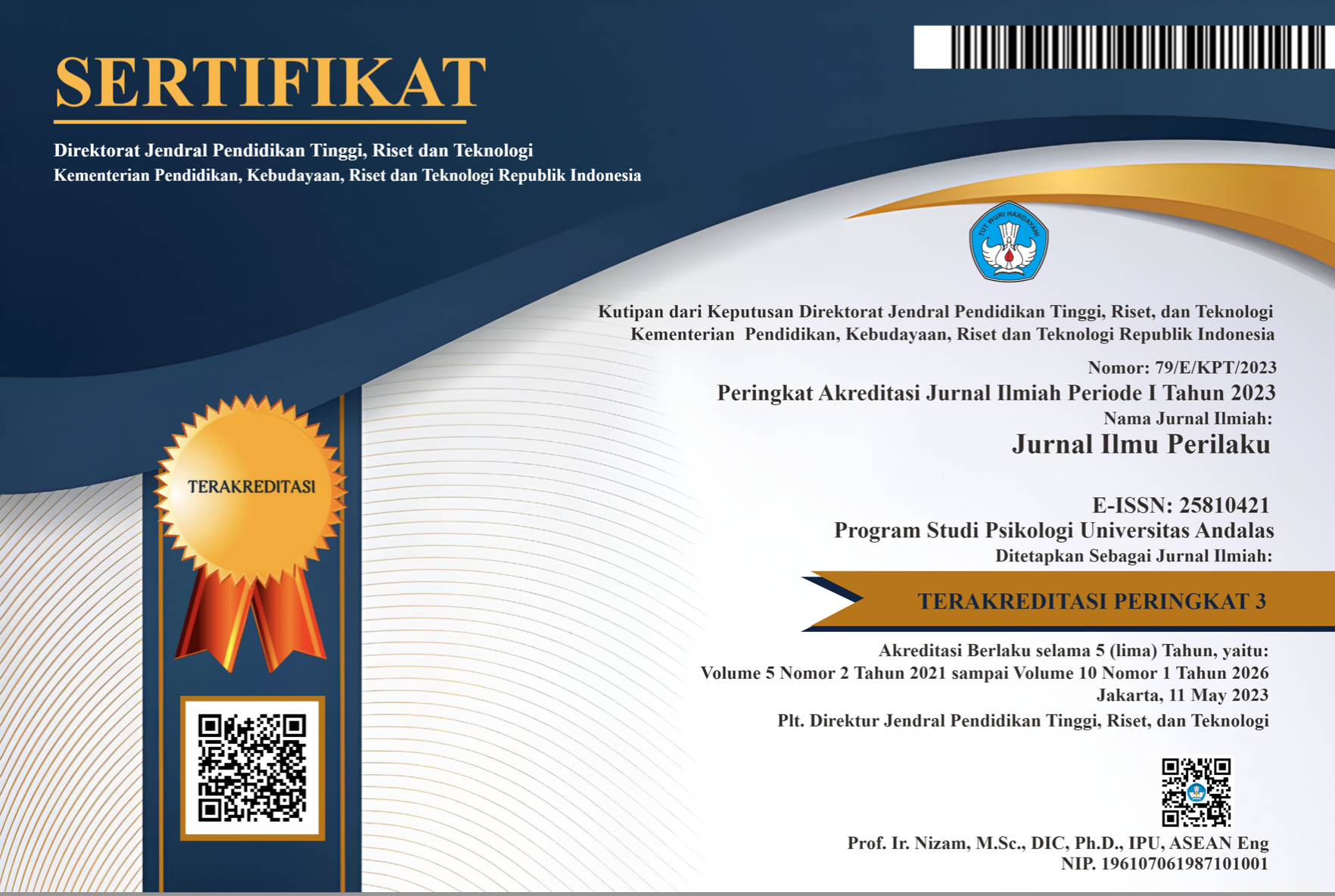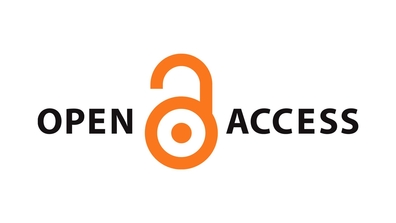Peran Persepsi Siswa atas Keterampilan Sosial-Emosional Guru terhadap Regulasi Emosi Siswa Sekolah Inklusi
Abstract
Emotion Regulation is important for student social interactions. Inclusive school that facilitate diversity can increase the student conflict. Conflict occurs because of the lack of skill in managing emotion. Therefore, the teacher has a task to support the development of student emotional regulation. The purpose of this study was to empirically examine the role of teacher social-emotional skills on emotional regulation in students at inclusive schools. The participants of this study were 109 students aged 9-13 years from three different inclusive schools at Yogyakarta. The method that used is survey by directly distributing the scale. Student perception about teacher social-emotional skills was measured by Teacher Social and Emotional Practice - Student Perspectives, while emotion regulation is measured with emotion regulation scale. Simple linear regression analysis is used to measure the role of teacher social-emotional skills on emotion regulation. The results showed that student perception about teacher social-emotional skills play a positive role on emotion regulation in students at inclusive schools. The higher student perception about teachers’ social-emotional skill the higher students’ emotion regulation.
Downloads
References
Armstrong, F. (Ed.). (2008). Inclusive Education. In Key issues for teaching assistants: Working in diverse and inclusive classrooms (p. 176). Routledge.
Bowie, B. H. (2010). Understanding the Gender Differences in Pathways to Social Deviancy: Relational Aggression and Emotion Regulation. Archives of Psychiatric Nursing, 24(1), 27–37. https://doi.org/10.1016/j.apnu.2009.04.007
Breeman, L., Wubbles, T., van, L. P. A. C., Verhulst, F. C., van, der E., Maras, A., Hopman, J. A. B., & Tick, N. T. (2015). Teacher characteristic, social classroom relationships, and children’s social, emotional, and behavioral classroom adjustment in special education. Journal of School Psychology, 53, 87–103. http://dx.doi.org/10.1016/j.jsp.2014.11.005
Budiarti, N. D., & Sugito, S. (2018). Implementation of Inclusive Education of Elementary Schools: A Case Study in Karangmojo Sub-District, Gunungkidul Regency. Journal of Education and Learning (EduLearn), 12(2), 214. https://doi.org/10.11591/edulearn.v12i2.8727
Callear, A., Harvey, S. T., & Bimler, D. (2017). Understanding the structure of children’s emotion-regulation strategies. International Journal of Behavioral Development, 41(3), 456–462. https://doi.org/10.1177/0165025416647525
Chan, T., & Yuen, M. (2015). Inclusive Education In An International School: A Case Study From Hong Kong. International Journal Of Special Education, 30(3), 12.
Creswell, J. W. (2012). Educational research: Planning, conducting, and evaluating quantitative and qualitative research (4th ed). Pearson.
Denham, S. A., Bassett, H. H., & Zinsser, K. (2012). Early Childhood Teachers as Socializers of Young Children’s Emotional Competence. Early Childhood Education Journal, 40(3), 137–143. https://doi.org/10.1007/s10643-012-0504-2
Field, A. P. (2009). Discovering statistics using SPSS: And sex, drugs and rock “n” roll (3rd ed). SAGE Publications.
Graziano, P. A., Reavis, R. D., Keane, S. P., & Calkins, S. D. (2007). The role of emotion regulation in children’s early academic success. Journal of School Psychology, 45(1), 3–19. https://doi.org/10.1016/j.jsp.2006.09.002
Gross, J. J. (2014). Handbook of Emotion Regulation, Second Edition (Second). The Guildford Press.
Hadi. (2015). Metodologi Riset. Pustaka Pelajar.
Harvey, S. T., Bimler, D., Evans, I. M., Kirkland, J., & Pechtel, P. (2012). Mapping the classroom emotional environment. Teaching and Teacher Education, 28(4), 628–640. https://doi.org/10.1016/j.tate.2012.01.005
Jennings, P. A., & Greenberg, M. T. (2009). The Prosocial Classroom: Teacher Social and Emotional Competence in Relation to Student and Classroom Outcomes. Review of Educational Research, 79(1), 491–525. https://doi.org/10.3102/0034654308325693
Karababa, A. (2020). The relationship between trait anger and loneliness among early adolescents: The moderating role of emotion regulation. Personality and Individual Differences, 159, 109856. https://doi.org/10.1016/j.paid.2020.109856
Kelsey, C., Zeman, J., & Dallaire, D. (2017). Emotion Correlates of Bullies, Victims, and Bully-Victims in African American Children. Journal of Black Psychology, 43(7), 688–713. https://doi.org/10.1177/0095798416680719
Macklem, G. L. (2008). Practitioner’s Guide to Emotion Regulation in School-Aged Children. Springer US. https://doi.org/10.1007/978-0-387-73851-2
Pelled, L. H., Eisenhardt, K. M., & Xin, K. R. (1999). Exploring the Black Box: An Analysis of Work Group Diversity, Conflict, and Performance. Administrative Science Quarterly, 44(1), 1. https://doi.org/10.2307/2667029
Prewett, S. L., Bergin, D. A., & Huang, F. L. (2019). Student and teacher perceptions on student-teacher relationship quality: A middle school perspective. School Psychology International, 40(1), 66–87. https://doi.org/10.1177/0143034318807743
Puri, M., & Abraham, G. (2004). Why Inclusion? In Handbook of Inclusive Education for Educators, Administrators, and Planners (p. 310). Sage Publications Ltd.
Santrock, J. W. (2015). Life-span development (Fifteenth edition). McGraw-Hill.
Saptandari, E. (2019). Understanding Indonesian Primary School Teachers Social-Emotional Practice. Massey University.
Sutton, R. E., & Wheatley, K. F. (2003). Teachers’ Emotions and Teaching: A Review of the Literature and Directions for Future Research. Educational Psychology Review, 32.
UNICEF. (2017). Inclusive Education—Including children with disabilities in quality learning: What needs to be done? Inclusive Education, 4.
Utantoro, A. (2016). Yogyakarta bertekad jadi Kota Inklusi [..Com]. Media Indonesia. https://mediaindonesia.com/read/detail/77714-yogyakarta-bertekad-jadi-kota-inklusi
Wulandari, A. (2018). Hubungan antara Kualitas Relasi Guru-Siswa dan Regulasi Emosi pada Anak Usia 9-11 tahun. Universitas Sanata Dharma.
The non-commercial use of the article is governed by the Creative Commons Attribution license as currently displayed on Creative Commons Attribution-NonCommercial-ShareAlike 4.0 International License.
JIP's spirit is to disseminate articles published are as free as possible. Under the Creative Commons license, JIP permits users to copy, distribute, display, and perform the work for non-commercial purposes only. Users will also need to attribute authors and JIP on distributing works in the journal.
Please find the rights and licenses in Jurnal Ilmu Perilaku (JIP).
- License
The non-commercial use of the article will be governed by the Creative Commons Attribution license as currently displayed on Creative Commons Attribution-NonCommercial-ShareAlike 4.0 International License.
- Author’s Warranties
The author warrants that the article is original, written by stated author(s), has not been published before, contains no unlawful statements, does not infringe the rights of others, is subject to copyright that is vested exclusively in the author and free of any third party rights, and that any necessary written permissions to quote from other sources have been obtained by the author(s).
- User Rights
JIP's spirit is to disseminate articles published are as free as possible. Under the Creative Commons license, JIP permits users to copy, distribute, display, and perform the work for non-commercial purposes only. Users will also need to attribute authors and JIP on distributing works in the journal.
- Rights of Authors
Authors retain the following rights:
- Copyright, and other proprietary rights relating to the article, such as patent rights,
- The right to use the substance of the article in future own works, including lectures and books,
- The right to reproduce the article for own purposes, provided the copies are not offered for sale,
- The right to self-archive the article.
- Co-Authorship
If the article was jointly prepared by other authors, the signatory of this form warrants that he/she has been authorized by all co-authors to sign this agreement on their behalf, and agrees to inform his/her co-authors of the terms of this agreement.
- Termination
This agreement can be terminated by the author or JIP upon two months’ notice where the other party has materially breached this agreement and failed to remedy such breach within a month of being given the terminating party’s notice requesting such breach to be remedied. No breach or violation of this agreement will cause this agreement or any license granted in it to terminate automatically or affect the definition of JIP.
- Royalties
This agreement entitles the author to no royalties or other fees. To such extent as legally permissible, the author waives his or her right to collect royalties relative to the article in respect of any use of the article by JIP or its sublicensee.
- Miscellaneous
JIP will publish the article (or have it published) in the journal if the article’s editorial process is successfully completed and JIP or its sublicensee has become obligated to have the article published. JIP may conform the article to a style of punctuation, spelling, capitalization, referencing and usage that it deems appropriate. The author acknowledges that the article may be published so that it will be publicly accessible and such access will be free of charge for the readers.










